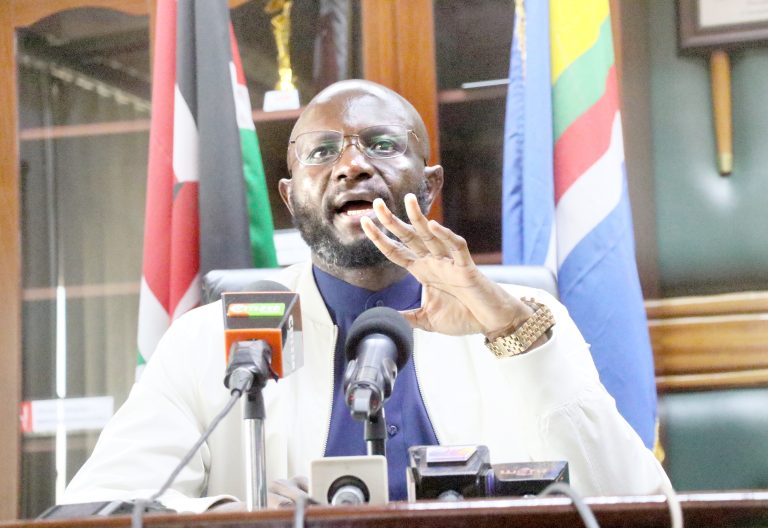Education, health lose as defence wins in 2025/26 budget
By Mercy Mwai, June 5, 2025School capitation, absorption of the Universal Health Workers and the recruitment of 10,000 police officers have suffered huge budget cuts in the 2025/26 financial year.
Also affected are the recruitment of National Intelligence Officers, the Police Insurance Scheme and the Hustler Fund.
However, the biggest winners in the budget include the Ministry of Defence, which got an increment of Ksh2 billion for the recruitment of Kenya Defence Forces (KDF) officers, Ksh5 billion for operations in Somalia and Ksh6 billion for security operations.
A report tabled by the Budget and Appropriations Committee (BAC), chaired by Alego Usonga MP, Samuel Atandi, said the 2025/2026 budget estimates have been guided by expenditure ceilings set during the consideration of the Budget Policy Statement.
“While the total budget is projected at Ksh4.239 trillion, the National Treasury has made slight adjustments compared to the ceilings in the BPS, with the final estimates falling short of the BPS projection of Ksh4.297 trillion by Ksh57.8 billion. This downward revision signals a cautious approach to fiscal planning aimed at aligning spending commitments with available resources,” the report reads.
For instance, in education, the committee proposed a reduction in key areas such as school capitation and implementation of Junior Secondary Schools (JSS) and used the same monies to fund school examinations and invigilation.
Proposed reduction
While the committee proposed a reduction of Ksh900 million from primary school capitation, Ksh3 billion from secondary school capitation, Ksh2 billion from Junior Secondary School capitation and Ksh620 million from teacher capacity, it proposed an increment of Ksh5.9 billion for examination administration and investigations under the Quality assurance standard vote.
The higher education sector has also been affected as the committee proposed a reduction of Ksh460 million from the construction of 52 Technical Training Institutes (TTIs), as well as suggested a reduction of Ksh1.3 billion from Government students in private universities.
The reduction comes just days after the government released about Ksh21 billion as capitation to public schools.
Under the Free Primary Education (FPE), the government allocates Ksh1,420 per primary school learner annually and Ksh15,042 per junior school student.
For secondary education, the annual capitation is Ksh22,244 per learner, although this has recently been reduced to approximately Ksh15,000 per year.
Apart from capitation, the education sector has non-funded areas and is seeking an additional Ksh1.9 billion for the recruitment of TVET instructors, Ksh17 billion for scholarships of over 208,000 students expected to join the university and Ksh7.3 billion for the conversion of 20,000 intern teachers on permanent terms.
The reductions come despite the committee of education and Tinderet MP Julius Melly telling BAC that the absence of dedicated financial support has led to uncertainty within the education sector, and thus calling for the urgent need for budgetary intervention.
He said that in the current fiscal year, examination-related funding was provided as an emergency through a supplementary budget, underscoring the necessity for a structured approach in future financial planning.
“There are substantial deficits within the Department of Higher Education, particularly in student-centred areas such as loans and sponsorship under the new funding model. If left unaddressed, these financial gaps could significantly affect university operations,” Melly stated.
In the department for medical services, the department has only been allocated Ksh2.1 billion for the absorption of 8,500 Universal Health Coverage (UHC) workers who are currently on strike against a total requirement of Ksh8.8 billion.
The Ksh8.8 billion is required to not only convert the workers into permanent and pensionable terms but also provide for the payment of gratuity upon expiry of their contract in May 2026.
Apart from UHC workers, the department has also suffered huge cuts as the committee has proposed a reduction of Ksh2 billion from the Emergency, Chronic and Critical Illness fund which is one of the critical components under the Social Health Authority (SHA), reduction of Sh20 million from the Digital Health Authority, reduction of Ksh100 million from the Primary Health care fund.
The National Police Service (NPS) was also not spared, as monies meant for police recruitment and police insurance were not factored in.
Police recruitment
The department has requested for additional Ksh3.5 billion to recruit 10,000 police constables, Ksh9.8 billion for police insurance, Ksh8.1 billion for security operations, and Ksh767 million for pending bills.
NPS has said that the 10,000 police officers will be used in the 2027 General Election and the production of new uniforms.
“The police to population ratio stands at 1:509, which falls short of the United Nations recommended ratio of 1:450. To address this gap, the NPS proposed the recruitment of 10,000 police constables. However, the proposed reduction in the recruitment budget from Ksh3.22 billion in the financial year 2025/2026 estimates is likely to adversely affect this requirement,” Narok West MP and Administration and Internal Security Committee chairperson Gabriel Tongoyo said.
The National Intelligence Service (NIS) has also been affected as the Ksh1 billion required for recruitment has not been provided for, the Hustler fund vote has been reduced by Ksh700 million, the Judiciary vote on the dispensation of justice has been reduced by Ksh946.05 million, while the Ksh10 billion required for fertiliser subsidy has not been included in the budget.
